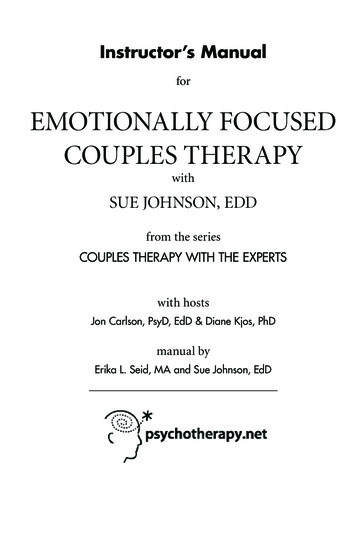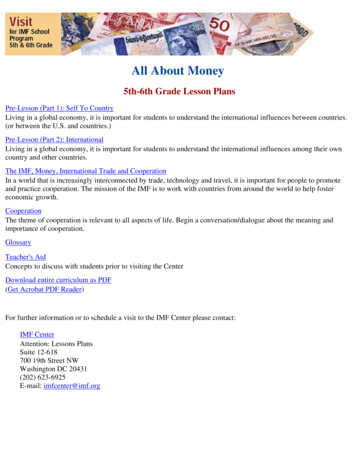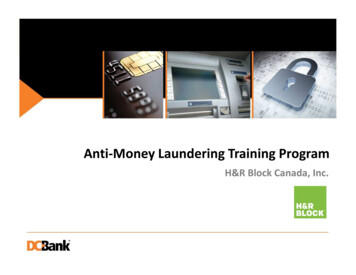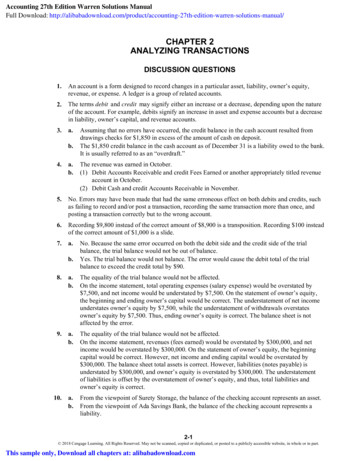
Transcription
1COUPLESand MONEYcreditCouples & Money 2016
2Copyright 2016 by credit.org. This publication is copyrighted. All rights are reserved. No part of this book maybe used or reproduced in any manner whatsoever without prior permission of credit.org.Legal Disclaimer: Liability claims regarding damage caused by the use of any information provided will berejected. Information presented is to the best knowledge of the author and editors correct; however, if thereader intends to make use of any of the information presented in this publication, please verify informationselected. No information provided here, or materials referenced, is intended to constitute legal or tax advice.You should not rely on our statements (or materials referenced) for legal or tax advice and should always confirmsuch information with your lawyers or tax professionals, who should be responsible for taking whatever steps arenecessary to check all information and personally ensuring that the advice these professionals provide is based onaccurate and complete information and research from any available sources.Couples & Money 2016
1About credit.orgWe are a nonprofit organization founded in 1974.We offer personal financial education and assistance with money, credit, and debt management througheducational programs and confidential counseling.Accredited by the Council on Accreditation (COA)Member of the Financial Counseling Association of America (FCAA)Approved by the Department of Housing & Urban Development (HUD)Member of the Better Business Bureau (BBB)NFCCMember of the National Foundation of Credit Counseling (NFCC)Begin a brighter financial future today.Inland Empire Campaign Sponsor for America SavesUnited Way Partner OrganizationUnited Way of theInland ValleysWWW.UWIV.ORGHeadquarters Office: 4351 Latham St Riverside, CA 92501Mailing Address: P.O. Box 5438 Riverside, CA 92517-5438800.947.3752 fax: 951.328.7750www.credit.org e-mail: education@credit.orgCouples & Money 2016
2IntroductionOver and over, research studies indicate that money is a source of conflict for couples. One studyshowed that more than three-quarters of young couples divorcing before age 30 reported financialproblems as the primary cause of their divorce. Another study found one-third of married couples citedmoney as their #1 issue.Level of income, however, is usually not a significant variable. Although a major indicator of familystrength is having enough income to provide basic necessities, over and above that, the amount ofincome a couple has is not usually a significant indicator of marital satisfaction.The reality is that for many couples, money in and of itself is not the issue. In her book Canadian FamiliesPast and Present, Emily Nett suggests that “Couples who fight about money argue more often abouthow it is to be spent, than about how much they have.” It is the set of symbols that money representsthe values, expectations and personal meaning attached to money that is often the true root of theargument.Unfortunately, many couples never figure this out. Arguments keep arising about the same issues.Feelings get hurt, anger builds, and hope dissipates. What lies behind these conflicts? There are manyinter-related pieces of this puzzle.Couples & Money 2016
3Planning StylesONE PIECE OF THE PUZZLE IS DIFFERENT STYLES OF FINANCIAL PLANNINGMorphostatic planners. These folks are oriented to the present. They buy what they want now and don’twait for a sale or even evaluate whether particular purchase is necessary. Morphostatic planners haveinflexible standards—they simply want the best. They also tend to be fairly conventional in their buyingand planning, operating by a set of rules.Morphogenic planners. These people are flexible, wanting as many people as possible involved in thepurchasing process. A morphogenic person usually considers all of the possible consequences involved ina particular decision and takes considerable time to reach a conclusion.What happens when these different types marry? It isn’t hard to imagine some of the fights that coulddevelop around financial issues.Bob: What do you mean you bought a new CD player!Mary: You know I’ve wanted a new one for a while!I saw this one at the store, it had every feature Iwanted, and so I bought it.Bob: But it’s not in our budget-and we didn’teven talk about it first! You’re always buying onimpulse!Mary: Well! If I waited for you to make a decision, there would be a wholenew technology developed before we got around to purchasing a new soundsystem!And on it would go from there. Bob and Mary probably have a lot of fights about when and how to spendmoney, and unfortunately, their conflicts are not likely to get resolved.Couples & Money 2016
4Values and ExpectationsBut planning styles aren’t all that is different for this couple. Another piece of the puzzle involves thevalues and expectations we hold. These are often even stronger sources of conflict than planning styles.In fact, our planning styles are often an outgrowth of the values we hold.Our values are the standards that we hold—some conscious, others less so. Unfortunately, when youdon’t know what values you hold, it is difficult, even impossible, to talk to others about them.Knowing about our values, however, does not necessarily mean that we share them with our mates. In histext, Human Intimacy, Cox says that most couples today pay almost no attention to each other’s financialvalues and history. It’s not very romantic to talk about your credit history or what you think about debt.Most people assume that the person they love thinks exactly the same way they do about money, andhas the same financial goals. Values are deeply rooted in our history and experience of life. From birth,we begin to learn what is important from our families. The acquisition of values continues on through theschools, groups and teams we belong to, friendship and relationships we are part of. Sometimes othersare aware of what they are teaching us. Often they are not.The media also plays a big role in development of values. Television shows, movies and theadvertisements that support these mediums all try to influence us to their advantage.When it comes to values about money, some people learn the value of thrift. These people take greatpride in saving money. Others learn to value extravagance or luxury. One may have learned the value ofsaving for a rainy day while another learned to live for today.Couples & Money 2016
5Differences in Values Make for ConflictConsider George and Patty purchasing a new car:George: Our car is getting so old. I saw an ad for a new, really hot model! It’s goteverything—nice lines, good pick up Patty: What’s wrong with our car! It’s only three years old. It meets my needs!George: It’s getting old—it’s rusty. And it hasn’t got all the perks of this newmodel.Patty: Cars aren’t toys George! You have a car to getyou from A to B. Our car does this quite well! Wehaven’t saved enough money for a new car!George: We don’t need money—we can lease it! It’sgreat! Look, here’s a brochure! Look at this baby!Patty: Speaking of baby—how are we going to get the kids and all their stuffinto that car. It barely has a back seat—let alone any cargo space. Grow up andface reality, George!George: There you go again, acting all high and mighty. You never listen to myideas!Well! What do you think happened in the long run? Did George go out and lease the car on his own? Didthey cool down and look at the real issues?During their discussion, George and Patty revealed many of their values about money. George believes:your car is an extension of your identity/personality; new is better than old; leasing or renting isacceptable.Patty, on the other hand, sees a car as being utilitarian in purpose; believes you save in order to purchase;and possibly that owning is better than renting or leasing. These are pretty drastic value differences.However, if George and Patty can clearly outline these values, the more specific the better, they can atleast begin to negotiate. If they aren’t clear about the differences, they will just continue having the samearguments.Think of your last family discussion about money. How did it go? Perhaps you haven’t had one in years—it’s too touchy! Next time you start talking about money, look at the values behind what’s being said.That’s the place to start.Clarify the values you hold as individuals—and the ones you hold together. What values do you agree on?How much freedom is there for differences? What does money symbolize for you? Security, love, power,status, esteem, success, self respect, competence, intelligence, acceptance and lifestyle are some of themore common symbols. Explore how values and symbols create conflict for you as a couple or family.Couples & Money 2016
6How To Talk About MoneyFIND A NEUTRAL TIMEDon’t wait until your spouse has charged up a storm on the credit card or another hot financial issuearises to broach the subject.The goal is to have a calm relaxed discussion when there’s no particular money issue at hand.SHARE YOUR FEELINGSVolunteer your own feelings about a financial issue and it may encourage your partner to do the same.If your relationship is your first priority you’ll both have to be willing to negotiate. Share your feelings,experiences, and hopes about money.KNOW WHERE YOU STANDBe honest with yourself about how you feel. If you’ve always been independent, for example, it may behard for you to be taken care of financially. If you have more assets then your partner, you may feel fearabout risking your hard earned money, or resentment if his or her spending habits are not good. You haveto be honest with yourself about these feelings in order to be honest with your partner.BRING IN A THIRD PARTYIf you can’t seem to talk about finances, seek out a counselor to help you sort through your financialissues. This could be a financial counselor or a therapist or marriage counselor.Couples & Money 2016
7Track Your SpendingKnowing where your money is going is the first key to financial security, and keeping a budget, whichincludes tracking your spending, is the only way to really know where your money is going.Where to begin when creating a budgetThere are two things everyone needs to know before they begin to budget:1. How much they earn2. How much they spendMost people can tell you to the penny what they earn in a month. Our paychecks tend to look the sameweek after week.However, very few can say with any certainty what they spend. In order to create a budget, onemust do the work necessary to have a thorough knowledge of their spending habits. Without a solidunderstanding of what one spends, no budget can hope to be accurate enough to be useful. We believemany budgets fail because not enough effort is put into tracking one’s spending as part of the budgetingprocess.You’ll find budgeting sheets on the next few pages that will help you add up your living expenses and seewhere you stand. You’ll need that information to make adjustments to your spending that will allow youto stay within your income.We recommend that you track all of your spending for at least 90 days. You will be great the first 30days, start to slack off the next month and then back to your old ways the third month. It takes somework, but it’s a good habit to get into and its easier as you do it more and more. There are a variety ofmethods you can use to track your spending: Use the forms provided in this book Carry a small notebook Keep your receipts in a separate envelope for each day Use software like Microsoft Money or Quicken (chances are you already own one of theseapplications if you own a personal computer)Use whatever method works for you; the main objective is to track where your money is going. Butremember, tracking will only work if you include every single expense. Every time you drop 75 in avending machine, you have to make note of it.Here’s a guarantee: if you track your spending faithfully, there will be some surprises. You’ll learn thatyou are spending money in ways you never realized. Once you are armed with this information, you canconstruct a new, more effective budget.Couples & Money 2016
8Daily Tracking SheetDateCellWater/Mortgage/ PropertyGas/Car2nd CarInsurance HOAPhone/ Sewer/ GroceriesRentTaxesElectricPayment 2232425262728293031TotalCouples & Money 2016
9Daily Tracking 122232425262728293031TotalCouples & Money 2016MedicalCable TVEmergencySavingsMisc
10TRACKING SHEET FOR MONTHLY EXPENSESUse this sheet to summarize your monthly expenses. Make copies of this page as needed.Net rsonalSavingsTotalsNet Income Per Week:BudgetMonthly ExpenseMortgage/Rent2nd MortgageProperty Taxes/12Homeowner’s InsuranceGas & ElectricWater/Sewer/GarbageHOA DuesInternetPhoneFood: Dining OutGroceriesInsuranceMedicalCar Payment2nd Car PaymentAuto InsuranceDMV Miscellaneous (Cable TV)Personal (Cosmetics, al ExpenseTotal IncomeTotal SurplusTotal DeficitCouples & Money 2016IncomeIncomeIncomeIncomeWeek 1Week 2Week 3Week 4
11Creating Your BudgetThree things you need to know before creating a budget:Your budget should be developed based on three things: your income, your expenses, and your goals.To begin, establish your current financial situation by looking at your monthly budget. Two pieces ofinformation are essential when preparing a budget: what you earn and what you spend. We’re constantlyamazed at how many consumers have no idea what they spend every month.1. Add up your monthly income (all sources)2. List your expenses3. Establish the gapIf you have a negative cash flow, then it’s time to cut back.Use this chart to track all of your sources of income:Monthly IncomeGrossSource:JobSpouse’s JobPart-Time JobRental, Room & Board ReceivedCommissions, BonusesTax Refund (annual amt divided by 12)Investment IncomeGovernment BenefitsUnemployment InsuranceChild Support/AlimonySupport from Family/FriendsPersonal Loans CollectedGarage/Yard SalesOtherTotal Monthly Income:Couples & Money 2016Net
12Setting GoalsThe purpose of creating a budget in the first place.An essential part of achieving financial freedom is setting clear goals and employing some intelligentjoint planning. You need to know what your financial goal is, and in what time period you hope to achieveyour goal. It’s suggested that the whole family be a part of it to make it successful!A short-term goal should be accomplished within one year. Say you plan to take a vacation that will cost 1200 next year. You’ll need to save 100 per month to reach that goal in time.A mid-range goal takes between 2 and 5 years to accomplish. Saving for a car might be a good mid rangegoal.Long-term goals take over 5 years to achieve. Saving for retirement, college, or to purchase a home arecommon long-term goals.FinancialGoalsExample: Anew et ed# of payperiods untiltarget dateSavingsneeded perpay periodSavingsneeded permonth36 months 20,650 6,250 14,40072 200 400Total:People who putgoals in writingare significantlymore likely toachieve them.Couples & Money 2016
13Our Financial GoalsTake a few minutes to write down your financial goals. They don’t need to be absolute; write down whatyou’d like to do and then you can decide which goals are the most important to both of you.Couples & Money 2016
14MONTHLY BUDGETNow that you’re more familiar with your income, expenses and goals, it’s time to propose a monthly budget:Necessary ExpensesCurrentProposedDiscretionary ExpensesCurrentProposedHousing Rent/MortgagePersonal2nd MortgageProperty TaxesInsuranceHOA DuesGas/ElectricityWater/Sewer/TrashTelephoneFood GroceriesDining OutAt work/schoolInsurance ie/VideoDining OutSports/Hobbies/ClubsVacations/TravelMedical Pet Care/VetTransportationGiftsCar Payment 1Car Payment c TransportationCell ernet AccessOtherChild CareDaycare/SittingChild Support/AlimonyTotal Discretionary Expenses:MiscellaneousDebt PaymentsBanking FeesLaundryUnion DuesOtherCreditor NameIncome TaxesPrior YearEstimated Tax PaymentsSavingsEmergencyGoalsTotal Debt Payments:Total Essential ExpensesCouples & Money 2016Monthly Payments
15Adding it all upMaking sure you have a workable budgetNow it’s time to put everything together and see whether your budget will work.Remember, your short, mid and long term goals should be included with your expenses on your budget.First, determine your total monthly expenses:Total Necessary ExpensesTotal Discretionary ExpensesTotal Debt PaymentsTotal Monthly ExpensesNow let’s see if your budget balances:Total Monthly Net IncomeMinus Total Monthly ExpensesBalance ( /-)Now, if your expenses exceed your income, you will have to work to find solutions if you are goingto avoid falling deeper into debt. Credit counseling can help if you have high debt payments that areupsetting your budget. You may also tighten your belt in some areas to balance your finances. Start bygoing through your expenses and make adjustements and reductions in spending wherever you can.Whatever you do, don’t cut into the 10% - 15% you should be saving; you need to save up to three – sixmonths’ income to get through an emergency before you can start saving for anything else. If necessary,you can look at ways to cut your spending and increase your earnings to make ends meet. For now, youshould set reasonable, attainable goals; you can also push a goal’s deadline back and give yourself moretime to save money.Re-evaluate your budget periodically, especially whenyour income or needs change. A budget is simply aguideline, a tool to help you save to buy the thingsyou want. With smart money management and clearlydefined goals, consumers can come to rely on creditcards less and less.We’re entitled to have the things we want; we justhave to be prepared to budget intelligently and saveto get them.Couples & Money 2016
16Budget Saving TipsYou can’t plug the leaks in your budget if you don’t know where they are! Keep tracking your spendingfor at least 30 to 90 days.HouseholdTake advantage of sales, coupons, and always comparison shop! Never pay more than you have to foranything.Personal CareFind out where discount stores, beauty colleges, and low cost dry cleaners are in your area. The moneyyou save will be your own.Child CareCan you work with your neighbors to form a babysitting co-op? Can relatives help out?ClothingDiscount outlets, secondhand clothing stores, and thrift shops are great places for saving money onclothing.EntertainmentRent a DVD or a video, make a bowl of popcorn and have fun!Check your local paper for events in your area that are free or almost free for entertainment. Fairs andfestivals are a good choice, and sometimes local attractions such as amusement parks offer couponsthrough local merchants.FoodPlan your meals, make a list, and stick to it when you shop. Stay out of the store! Try to shop once a weekor less. Extra trips to the store are budget busters.Avoid fast food – this is the #1 leak in most budgets.ALWAYS KEEP YOUR BUDGET IN MIND!Plan: Plan for the future, major purchases and periodic expenses.Set Financial Goals: Determine short, mid and long range financial goals.Know the Difference between Wants and Needs: Tale care of real needs first. Save what is left.Don’t Allow Expenses to exceed Income: Your take home pay is what you have available to spend or save.Couples & Money 2016
17WHAT YOUR SPENDING SHOULD LOOK LIKEThe ranges indicated here reflect income levels, family size, and personal choice. It’s not a mistake thatthe percentages above don’t add up to 100. Everyone’s finances are different, and if your employer provides your medical coverage for example, you may be able to put more into other expenses. Work withthese figures to establish your own guidelines.% ofMonthly IncludesIncomeHousingUtilities35-45% Mortgage, rent, property taxes, insurance, repairs and improvements.Housing and utility expense can vary significantly depending on geographic location(i.e. urban, suburban or rural) and adjustments to the suggested budget percentagesmay need to be increased or decreased to allow for local conditions. Also personsliving in high cost areas (metropolitan areas of California and other states) typicallyneed more budget allocated to housing expenses . Individuals and families in thelowest income range may find that they would need to consider alternative housingarrangements (living with family members, sharing a house, etc.) as housing expensecould exceed 60-75% of their income, leaving insufficient funds to pay for other basicbudget items.8-15%Gas, electricity, water, trash, sewer and telephone (regular & cell). If you arespending too much on utilities, consider switching long distance providers, saving upfor a more efficient furnace, conserving electricity, stop sending text messages, etc.Food10-20%All food items, dining out, pet food. On average, Americans spend 15% of theirincomes on food. Watch out for fast food, which is a big budget buster. It’s 5 timesmore expensive to dine out than to prepare meals yourself.Auto &Transportation15-25%Purchase and installment payments, gas & oil, repairs, insurance, parking &public transportation. Many of us have cars we can’t really afford. If that includesMedical8-15%Medical insurance premiums, prescriptions, doctor and dentist bills. Sincemedical bills don’t come along every month, consumers should save funds within the8-15% range for emergencies.Clothing3-5%All clothing purchases, shoes & alterations. There is a lot of gender-biasedPersonal &Miscellaneous5-10%Miscellaneous Club dues, admissions, hobbies, postage, tobacco,cosmetics, hair cuts and cable TV. Chances are you spend far more than 10%Savings &Investments5-10%It’s crucial that you set aside this 5-10% for your goals; as for investing, oneMonthlyInstallments10-20%Installments Credit card payments, personal & student loans, any otherdebt payments. If you are paying more than 20% of your income in unsecuredyou, consider trading your car for a more affordable one. And in general, leasing is abad idea.pricing in this category; women may find this figure harder to reach than men.in this category. Most of these are “wants” and not “needs,” so you shouldn’t put thisspending ahead of more vital items.shouldn’t consider it until they have significant savings ( 10,000 or more) in the bank.loans, you may be in serious financial jeopardy. Visit credit.org or call 1-800-WISEPLAN for free, confidential debt counseling.Couples & Money 2016
18Money Tips For Couples If both spouses work, most couples find it easier to have a joint household account for routineexpenses and a separate personal account for each partner. Discuss whether you will both contributeequally to the joint account or if you will each contribute in proportion to your respective incomes. Set aside a regular time for discussion of money matters, preferably a day when neither of you has towork. Scheduling regular times means less time will be necessary and problems can be avoided. Discussions will be shorter, calmer and more productive if you discuss facts and figures on paper. Avoid blaming each other for financial problems. Rigid attitudes, beliefs or expectations about howyou think your spouse should act will stifle your financial happiness and progress and cause problems inother areas of your lives as well. During your discussions try not to bring up how your parents or friends handle money. It is irrelevantand will make it more difficult for you and your spouse to reach mutually acceptable financial decisions. Keep each other regularly informed about all individual assets and debts whether in saving, checking orcredit accounts. Avoid surprises; they will often be misinterpreted and cause problems. Make sure each of you has individual credit cards in your own name, whether they were obtainedbefore or after marriage. Two good individual credit histories are better than one joint history whenyou apply for a loan. If one of you has a blemished credit record, the other’s clean record can help. From time to time, look at other ways of better managing your money, particularly if there is a changein job status which has or might lead to a change in income and expenses. Divide responsibilities for regular financial tasks as evenly as possible so that neither of you feels you’reshouldering the entire burden. Refusing to take an interest in or failing to develop competency in something as important as financialmatters can be as destructive to a relationship as insisting on complete control in such matters. Using money to control your spouse, as emotional blackmail to get your way or to bolster your selfesteem is likely to lead to retaliation either financially or in some aspect of your relationship. Make sure that you both discuss and agree about the use of any expected or unexpected windfall. Ifone spouse receives a windfall of money and makes a decision about its use without the agreement ofthe other, can seriously damage the trust you have established and harm your entire relationship. Involve your children in your family financial discussions and decisions as much as possible. Childrenusually want to be involved in decisions that affect them, such as plans for a vacation, or whether to buya new television or a DVD player. They find out about them anyway, and are even more frightened andinsecure when they see you attempting to hide such problems from them. If one of you thinks that your own or your spouse’s spending has gotten out of control, or if one of youhas constant or frequent worries about money that you can’t resolve together, seek help immediatelyfrom a professional financial counselor. Develop some short and long range financial goals together, and check your progress toward suchgoals as through the use of a net worth statement.Couples & Money 2016
19Your Credit ReportKnow what’s on it, and check it often.Your credit report has become increasingly essential to may areas of your life. The most importantthings you do; buying a home, buying a car, getting a new job, going to college – almost always involvesomeone reviewing your credit.Your credit report contains information on where you work and live, the credit accounts that havebeen opened in your name, how you pay your bills and whether you’ve been sued, arrested or filed forbankruptcy.Every consumer should check his/her credit reports on a regular basis; there may be mistakes on it thatcan wreak havoc on a person’s finances.Married couples retain their individual credit records and credit scores, but any joint credit accountsshould be reflected on both credit reports. This is one thing married couples should check for whenreviewing their credit reports. Often, married couples start out with very different credit scores. Gettingjoint accounts and making sure they appear on both credit reports will help the partner with the lowerscore to benefit from the good credit history of the other partner.The FACT Act of 2003 mandated that the three major national credit-reporting bureaus establish awebsite, a toll-free number and a mail address for consumers to request their credit report for free everyyear:1. Go to the website www.annualcreditreport.com. MAKE SURE you type the address correctly, or youmay end up at an imposter site set up by identity thieves.a. Type the exact address of the free report site, INCLUDING the www (that is, type www.annualcreditreport.com).b. Verify that you are immediately redirected to the secure page: https:// www.annualcreditreport.com/cra/index.jsp is the redirect address.c. Verify that the security lock is present in your browser.d. On the data entry page (the first page you visit after you tell the site what state you live in),verify that a “VeriSign security” symbol is present near the top right on the page. Click on thecertificate to ensure that it is indeed the certificate for www.annualcreditreport.com.2. Call by phone: 877-322-82283. To submit a request by mail, download the Annual Credit Report Request Form located at f and mail it to:Annual Credit Report Request ServiceP.O. Box 105281Atlanta, GA 30348-5281(Keep in mind that the location of the form or file name may change.) Do not contact the creditreporting bureau directly as this is the only method to receive a free credit report.Couples & Money 2016
20NotesCouples & Money 2016
COUNCIL ONACCREDITATIONFOUNDED1977United Way of theInland ValleysBBBWWW.UWIV.ORG FinancialCounselingAssociation ofAmericaNFCCBegin a brighter financial future today.Credit.org4351 Latham StreetRiverside, CA 92501PO Box 5438Riverside, CA 92517-54381-800-WISE-PLAN uples & Money 2016COUPLES and MONEY21
Member of the National Foundation of Credit Counseling (NFCC) Inland Empire Campaign Sponsor for America Saves United Way Partner Organization. Headquarters Office: 4351 Latham St Riverside, CA 92501. Mailing Address: P.O. Box 5438 Riverside, CA 92517-5438 800.947.3752 fax: 951.328.7750. www.credit.org e-mail: education@credit .



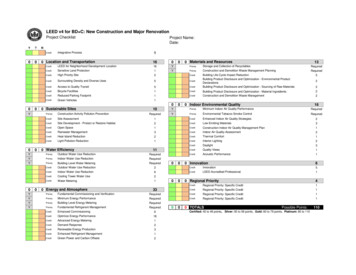
![[PDF] #Staymarried: A Couples Devotional: 30-Minute Weekly .](/img/66/download-20pdf-20staymarried-20a-20couples-20devotional-2030-minute-20weekly-20devotions-20to-20grow.jpg)
